




Elders has been working alongside South Australian farmers since 1839, and today, we’re dedicated to continuing this legacy through our ongoing focus on innovation and sustainability.
Our extensive network of specialists can provide tailored advice throughout your whole crop production cycle, enhancing your yield, and boosting your productivity and profit.

To learn more about our agronomy services, speak with your local branch or scan the QR code.


Welcome to the South Australian Grain Industry Awards 2024 gala dinner, an evening dedicated to celebrating the remarkable individuals and businesses who make our grain industry one of the most innovative and resilient in the world.
As we gather tonight, we acknowledge the immense contribution grain producers make to South Australia’s economy and regional communities. It is an honour to shine a spotlight on their efforts, recognising those who lead with vision, embrace innovation, and inspire others to rise to the challenges of modern agriculture.
This year marks the inaugural South Australian Grain Industry Awards, an initiative proudly established by Grain Producers SA. Designed to celebrate the exceptional achievements within our grain sector, these awards highlight the innovation, leadership, and dedication of individuals and businesses that make South Australia a powerhouse of grain production.
As the peak industry body representing grain producers in South Australia, GPSA is committed to promoting the value of the grain industry and its contribution to our state’s economy, environment, and regional communities. These awards are part of our broader effort to shine a spotlight on the extraordinary talent and vision driving our sector forward, ensuring its sustainability and success for future generations.
By recognising and sharing the stories of tonight’s finalists, we hope to inspire others, foster pride within our industry, and strengthen the connection between South Australian grain producers and the wider community.

As Minister for Primary Industries and Regional Development, I am pleased to support the inaugural South Australian Grain Industry Awards on behalf of the Government of South Australia, celebrating excellence in the South Australian grains industry. The awards will celebrate the impressive list of grain producers and industry contributors awards finalists, recognising excellence, leadership, and innovation within the State’s multi-billion-dollar grain sector. It is exciting to see the talent, quality and diversity of these finalists. The event is about celebrating each and every one of your contributions to the sector, and the passion and dedication you all share.
The finalists showcased in this booklet represent the very best of our industry. Each has been selected for their outstanding achievements, leadership, and passion for advancing grain production. Their stories are as diverse as the landscapes they farm, yet they share a common thread—dedication to excellence and a drive to secure a sustainable future for generations to come.
Within these pages, you’ll find insights into the journeys of our finalists, including a short Q&A that reveals their unique perspectives, motivations, and hopes for the industry. Their stories are not only inspiring but also a testament to the innovation and resilience that underpin South Australian agriculture.
To our finalists, congratulations on this well-deserved recognition. Your efforts remind us all of the incredible potential within the grain sector. And to everyone attending the gala dinner, thank you for joining us in celebrating their achievements and the future of our industry.
Enjoy this evening of celebration and reflection and let us continue working together to build a thriving, sustainable grain industry.
John Gladigau
Brad Perry Chair Chief Executive Officer
Grain Producers SA
Grain Producers SA
I would like to take the opportunity to acknowledge the important role Grain Producers SA plays as a voice for the grains sector in South Australia. Its role in the development and implementation of policies and projects that promote the economic and environmental sustainability of the sector is critical, as is its excellent working relationship with the government.
Thank you to Grain Producers SA for initiating this important event for the South Australian grains industry. Long may it continue to celebrate your sector’s successes and contributions to South Australia.
Hon. Clare Scriven MLC Minister for Primary Industries and Regional Development

sponsored by Elders
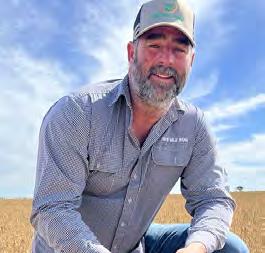
Location: Lower North
Kelvin Tiller is a dedicated contributor to the South Australian grain industry and his local community. Known for his extensive involvement with the Owen Agricultural Bureau, where he has served as president, Kelvin has long been a leader and advocate for knowledge-sharing and collaboration among farmers.
Beyond his industry contributions, Kelvin is a committed community member, actively participating in working bees and supporting local schools, sports clubs and community groups. He has also raised substantial funds for Variety and is a proud member of the local Fat Farmers fitness group. Each year, Kelvin brings joy to the region with his remarkable Christmas light display on the Nine Mile between Mallala and Balaklava.
Kelvin’s farm has been a hub for innovation and learning, hosting numerous trials for InterGrain, AgXtra, Kalyx, Elders and SARDI. Recently he also hosted the GRDC High Strength Soil Crop Walk. Despite the personal challenges of losing his father and damage to his family farm during the Pinery bushfire, Kelvin has continued to grow his farming enterprise west of the Nine Mile and remains an inspiration to his peers.
Kelvin’s tireless efforts and positive impact on his business, the grain industry, and the wider community make him a deserving finalist for the South Australian Grain Industry Awards.
What inspired you to pursue a career in the grain industry, and what has kept you passionate about it over the years?
I just grew up with a love for the farm. When I was young, I spent a lot of time with dad and was surrounded by everything farming. Both my parent’s families are still involved in farming as well. I have worked away at times and I’m always happy to get back to the farm. The ever-evolving nature of agriculture keeps it interesting with new challenges constantly arising.
Can you share a particular project, initiative, or achievement you are most proud of and why?
As the fifth generation, being able to take on the farm business from my parents is one of the things I’m most proud of. I’m hoping to see the day when the next generation have that same opportunity.
Moving our farming system to no-till and introducing high residue retention has been a great change for the progression of our business in the last decade, especially in our lower production country.
What does it mean to be nominated and shortlisted as a finalist for the SA Grain Industry Awards?
It is a big honour that others in the district feel that what I do is more than just farming. I do enjoy getting involved within the industry and community, which I have learnt a lot and meet some great people. I feel that there are many others that are worthy of this nomination but I’m also grateful for this opportunity and the recognition of what has been achieved.
Do you believe it is important that the SA grain industry celebrates its contribution to the state and if so, why?
I think it is important to recognise those in any industry that are doing great work. The Awards helps to highlight their achievements and hard work to the wider community. Without these people in our industry, we would not see the progression we have today.
What advice would you give to the next generation of grain producers or those looking to make a difference in the industry?
I feel everyone has something to offer the industry. Broaden your horizon, visit places outside of your local area and different industries. Share what you have learnt. Get involved within the industry where you can, which helps build your network and knowledge.
What’s the biggest opportunity and biggest challenge facing the grain industry in SA at the moment?
I can see a big movement for technology in agriculture with cameras, drones, satellite imagery, robotics etc into the future. Along with the opportunity of converting or improving the land we currently work.
Regarding the challenges, I feel urban sprawl is a huge issue for those farming on the city fringes. We are seeing more and more productive land being used for residential and this in turn creates logistical and commercial productivity issues.
sponsored by Elders
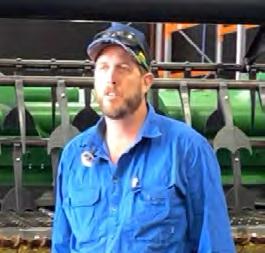
Location: Mallee
Andrew Thomas is a dedicated grain producer, mentor, and industry leader, widely recognised for his unwavering commitment to advancing sustainable farming practices in the Mallee region, farming at Moorlands and Wynarka. As the longstanding Chair of the Coomandook Agricultural Bureau and an active participant in Mallee Sustainable Farming, Andrew has consistently worked to foster collaboration and innovation in the agricultural community.
Andrew’s farm has been a hub for research and development, hosting trials for industry bodies such as GRDC, CSIRO, Mallee Sustainable Farming, Mackillop Farm Management, and the SA Grains Industry Trust, as well as commercial trials for organisations like Platinum Ag, Nufarm, and Trengove Consulting. His efforts ensure that research outcomes are farmer-focused and applicable to real-world conditions. Beyond his contributions to agriculture, Andrew is deeply involved in his community. He volunteers at the Tailem Bend Football Club, participates in the local farmer fitness group, and is an active member of the Moorlands community.
Andrew’s leadership extends to advocating for critical industry issues, including his vocal support for ending the GM Moratorium in 2020. His transparent approach to farming—openly sharing both his successes and lessons learned—has made him a trusted mentor to younger farmers and a role model in the region.
Through his leadership, innovation, and commitment to sustainability, Andrew has made a profound impact on his business, the wider industry, and the community, making him a deserving finalist for the South Australian Grain Industry Awards.
What inspired you to pursue a career in the grain industry, and what has kept you passionate about it over the years?
I grew up on our family farm, but earlier in my life I didn’t see a big future in ag. But with the evolvement of no-till and GPS technology, and many other developments like yield mapping, I got pretty excited about how we could go about farming in a more sustainable manner. Farming is ever-changing with many different challenges, and it’s the challenges and how we overcome them, that keeps me interested and passionate. Whilst at times it can be stressful, I believe there are so many more positives that make the challenges enjoyable.
Can you share a particular project, initiative, or achievement you are most proud of and why?
In 2011 we purchased our first disc seeder but given our tough, rocky conditions, we had a lot of maintenance issues. Over the years we re-designed it and made our own seeder that worked fantastic in our soils. We also adapted our bin to hydraulic drive for VR fertiliser and added liquid fertiliser tanks. While we don’t have that seeder now, it taught us a lot and I still feel that it was quite an achievement.
What does it mean to be nominated and shortlisted as a finalist for the SA Grain Industry Awards?
It has certainly been quite a humbling experience. I feel very honoured to be nominated for the award and am very excited about it. I look forward to meeting many other great nominees at the gala dinner night.
Do you believe it is important that the SA grain industry celebrates its contribution to the state and if so, why?
It’s a fantastic thing to do and I hope it can be continued for many years to come. Ag is a fantastic industry with so many great people involved around the state, all the way from researchers, agronomists through to some fantastic producers.
What advice would you give to the next generation of grain producers or those looking to make a difference in the industry?
Don’t feel afraid to reach out to producers that you look up to. Also get involved in your local farming groups and put your hand up to help out. It’s the best way to learn.
What’s the biggest opportunity and biggest challenge facing the grain industry in SA at the moment?
One of the biggest opportunities facing the South Australian grain industry is soil improvement/amelioration. There are still so many underperforming areas on our farms that we can look to improve and then matching the nutrients to the increased performance. I’d say one of our biggest challenges is the rising cost of doing business with machinery costs skyrocketing and also the rise of overhead costs, including insurance and a few others. It’s always been an issue but I feel the pressure is more than ever right now.
sponsored by Elders
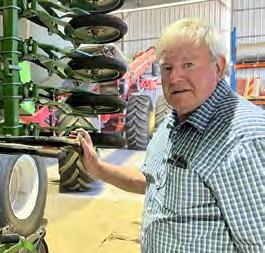
Andrew Polkinghorne is a trailblazer in grain production, known for his pioneering work in adopting fluid fertilisers on calcareous soils. His leadership in the Eyre Peninsula Liquid Fertiliser Buying Group has revolutionised fertiliser practices in the region, enabling farmers to transition from granular to liquid fertilisers. This innovation has not only improved crop yields but also delivered significant cost savings, estimated at $5.8 million over 20 years.
In addition to managing a 7,000-hectare farming enterprise at Lock, Andrew actively contributes to the agricultural community through various leadership roles. He serves as a trustee of the South Australian Grain Industry Trust (SAGIT), a former director of Agricultural Innovation Research Eyre Peninsula (AIREP), and Director of T-Ports Pty Ltd, and as an elected member of the District Council of Elliston. His 2023 Churchill Fellowship further highlights his commitment to research, allowing him to explore international practices in fluid fertiliser use on calcareous soils.
Andrew’s dedication to innovation, sustainability, and community development has had a profound impact on his business and the broader industry, making him a deserving finalist for the South Australian Grain Industry Awards.
What inspired you to pursue a career in the grain industry, and what has kept you passionate about it over the years?
The grain industry was a natural career course for me as it is where my interest in life is. I believe people are most successful when they are doing something they like. I was brought up on a grain farm and was involved in developing it from virgin scrub with quite limited resources. My passion was further ignited when I attended Marcus Oldham Farm Management College and was exposed to agriculture all over Australia. I also learned that agriculture could be a profitable business. I have remained passionate about agriculture because of the challenges and opportunities for development it provides and because of the way it uses technology and research and development to adapt to changing circumstances. We have come a long way.
Can you share a particular project, initiative, or achievement you are most proud of and why?
Probably the achievement I am most proud of is the development and expansion of our farming business from a very modest base to a substantial business that offers opportunities for the next generations and employees to prosper and take the next step. This has been achieved by implementing research and development outcomes, sound farm management and decision making, hard work along with some good luck, and some risk. All things considered it has been most rewarding.
What does it mean to be nominated and shortlisted as a finalist for the SA Grain Industry Awards?
While it is not something I have sought, it is an honour and a privilege to be recognised by one’s peers in an industry I love, and an industry that has many outstanding people, many of whom I have learned so much from.
Do you believe it is important that the SA grain industry celebrates its contribution to the state and if so, why?
I believe it is imperative that the South Australian grain industry celebrates its contribution to the state to raise the profile of agriculture and to increase the understanding of the importance of agriculture to the economy of the state. Many people making decisions about agriculture have limited experience of agriculture and it is important the correct policies are in place to allow the continued production of healthy, nutritious food that sustains both rural communities and urban communities. It was interesting in my travels to see the province of Saskatchewan in Canada and the state of Kansas in the USA where agriculture is absolutely front and centre of the public arena and to compare that with agriculture in England where they have to deal with many policy encumbrances. That certainly confirmed my view that the South Australian grain industry should maintain a high profile so there is some level of understanding of the industry by the general public.
What advice would you give to the next generation of grain producers or those looking to make a difference in the industry?
The country is run by those who turn up. Become involved and develop your skills in debating and public speaking. Put your hand up when positions become available. Become involved in the discussion. Take an interest in agriculture beyond the farm gate. Think strategically about the direction of agriculture in the future.
What’s the biggest opportunity and biggest challenge facing the grain industry in SA at the moment?
The biggest opportunity for the grain industry in South Australia at present is to get the carbon calculators and greenhouse gas emission policies correct and to know where SA grain farmers actually sit relative to other world producers. There are many broad assumptions being made in these models that are not necessarily correct for SA and our farming systems. They need much fine tuning before they are of any use to farmers and policy makers. For example, there are no mechanisms for farmers to offset their own emissions for the purchase of fertiliser. There is no differentiation between buying from a fertiliser company that manufactures the fertiliser with clean or dirty energy. One challenge is to do this soon enough to have some significant influence on policy outcomes. The other challenge is to bring farmers along with the process and to convince them that if they are not involved, they will not be heard in the debate. There is enough of these processes happening in the rest of the world including amongst our trading partners and we will find it very difficult to stand aside from this issue. It is a case of being prepared when it comes whether we agree with it or not.The other immediate challenge is the cost price squeeze on agriculture where, as a primary industry it is very difficult to pass on costs as some other industries can. Many farmers have had a very poor season and will need to draw on resources, either their own or the banks to plant the next crop. While input prices have levelled to some extent, although still high, interest rates, council rates and other charges have risen well above the rate of inflation. Many farm businesses are paying five and six figure sums for their council rates. Most homeowners would only be paying four figure sums. This is not a sustainable situation and is a challenge farm organisations will need to address. Overhead costs become very significant in years of negative profit. There will be some difficult conversations with bank managers in the next three months and there needs to be support for those in difficulty.
sponsored by Elders
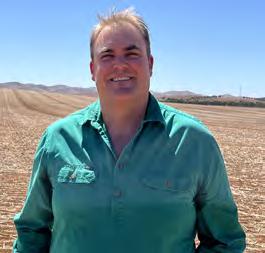
Location: Mid North
Damien Sommerville is a passionate advocate for sustainable agriculture and a respected leader within the grains industry. As a grain farmer and agronomist, Damien combines practical expertise with a deep commitment to addressing critical industry challenges.
Damien’s leadership extends to his role as a long-standing member of GrainGrowers’ National Policy Group (NPG), where he represents South Australian growers and helps shape national policies that support the grains sector. He is also a past chair of the Hart Field Site Group, a key organisation promoting agronomic research and innovation, where he played an instrumental role in advancing best practices for sustainable farming across the community.
On his own farm, Damien has implemented cutting-edge agronomic techniques to enhance soil health and improve resilience against climate and market pressures. His focus on sustainability and profitability has not only strengthened his business but also set a positive example for others in the industry.
Damien’s ability to amplify the voices of South Australian grain producers, foster community collaboration, and champion forwardthinking agricultural practices makes him a deserving finalist for the South Australian Grain Industry Awards.
What inspired you to pursue a career in the grain industry, and what has kept you passionate about it over the years?
Being part of multi-generational farming families on both sides, farming was in my blood early. I knew early on that I didn’t want to be behind a desk 24/7 and I saw agriculture as a way to be outside, while still using problem solving skills. Early on as an agronomist, every paddock was a different problem to look into and research. Now I can continue refining this process on our farm. I have had some fantastic people help me and pass on their knowledge and skills, especially early on as a graduate agronomist. The passion those people had for agriculture was some of the inspiration to continue to grow and service the industry.
Can you share a particular project, initiative, or achievement you are most proud of and why?
Being part of Hart Field Site when we came up with the idea to start an internship programme is a career highlight. We saw that there was a future gap for regionally trained and based researchers who understood farming systems groups. We were able to get it off the ground with help from SARDI and SAGIT. It’s still going now, with many high-quality people across South Australia and the rest of Australia having benefited from that year of training and mentorship. The benefits to agriculture over the decades due to these skilled and passionate people in our industry cannot be understated.
What does it mean to be nominated and shortlisted as a finalist for the SA Grain Industry Awards?
It’s been a great honour to be nominated for the Awards, let alone be shortlisted, especially with the calibre of others shortlisted. Do you believe it is important that the SA grain industry celebrates its contribution to the state and if so, why?
Celebrating our contribution to society as an industry is important and it highlights our positive culture, builds our social license and hopefully attracts new people. The more others see the passion and positivity in our industry, the healthier our industry will be. What advice would you give to the next generation of grain producers or those looking to make a difference in the industry?
Get involved in grower groups, or industry representation. You will meet fantastic people, learn so much from being involved and you will get back far more than you give.
What’s the biggest opportunity and biggest challenge facing the grain industry in SA at the moment?
Our biggest challenge is, and will remain, people. Getting the right people to join our industry and develop the skill sets that will enable us to continue to grow sustainability will be vital.
sponsored by PIRSA

Location: Mallee
Jock McNeil is an early adopter and leader in strategic soil amelioration in South Australia, known for his innovative approach to farming in South Australia’s Mallee region. Managing a significant enterprise between Loxton and Paruna, Jock has successfully integrated advanced soil amelioration techniques, including deep ripping, inversion ploughing, and spading, to improve soil health, boost productivity, and enhance sustainability.
Jock is an active contributor to the agricultural community through his involvement with Mallee Sustainable Farming (MSF). He regularly hosts field days and crop walks, openly sharing insights from his trials with fellow farmers and industry professionals. His efforts to promote knowledge exchange have fostered broader adoption of innovative practices across the region.
By showcasing the benefits of advanced soil management techniques, Jock has not only improved his own farming operations but also made a lasting impact on the wider industry. His proactive response to challenges like heatwaves and frost has provided valuable guidance for farmers navigating adverse conditions, solidifying his role as a leader and mentor in the Mallee farming community.
What inspired you to pursue a career in the grain industry, and what has kept you passionate about it over the years?
I was always interested from a young age; it’s an amazing childhood growing up on a farm. Subconsciously, my passion for farming came from always being involved and observing dad pursue his career as a farmer, whether that was in the paddock or witnessing his input and contributions to the industry. His commitment, resilience, positivity, and passion for farming is inspiring, not only for myself but I know he has been a great mentor for many others.
I believe the continuous evolution of farming is what drives my passion. There are opportunities and challenges every day in farming and no two days or seasons are the same. Like any grain producer, the buzz of pulling off a rewarding crop is very satisfying! So having the opportunity to continuously analyse and tweak the system to improve the reliability of this happening is challenging and exciting. Can you share a particular project, initiative, or achievement you are most proud of and why?
To me the “project” is farming in the Mallee. I was given an opportunity at a young age of managing our Mallee property. With no preconceived ideas and little understanding of low rainfall farming, I was in the deep end working out what was possible and what was not, with great responsibility. Turning some of our unproductive land into something productive using trial and error, industry information and technology has been a journey so far. Sharing these agronomic learnings with industry peers is probably my greatest achievement. As an early adopter of optical spot spraying and strategic soil amelioration here in South Australia, I feel I have assisted manufacturers, agronomists and most importantly, growers to make positive changes to farming systems in the low rainfall zone.
What does it mean to be nominated and shortlisted as a finalist for the SA Grain Industry Awards?
It’s a strange feeling being nominated and in the limelight. To be nominated and shortlisted is a grateful validation that I have contributed to the industry I am so passionate about.
Do you believe it is important that the SA grain industry celebrates its contribution to the state and if so, why?
I do believe it is important to promote the industry and showcase the great people involved in it. Ag is a huge driver of the state’s economy, and this should get greater recognition publicly in a positive manner. If celebrating Ag’s contribution is a platform to introduce or encouraging others to get involved in agriculture, it can only be positive. I’d like to think such celebrations will be a step forward to closing the connection gap between rural and metro communities again.
What advice would you give to the next generation of grain producers or those looking to make a difference in the industry?
My advice would be “always carry a shovel”! At the end of the day, managing the land is what drives production and profitability and having a good understanding of what is happening below the ground will lead to better outcomes above the ground. Second to that, my advice is to dive into publications, research papers and grains events across the country. These will often be a link to the top producers, agronomists, researchers, and industry representatives across Australia and don’t be afraid to reach out and contact them for advice or a conversation.
What’s the biggest opportunity and biggest challenge facing the grain industry in SA at the moment?
The biggest opportunity in the grain industry is networking. I feel ag is a unique industry in the way it continuously strives for better outcomes openly. Networking with other growers and industry people across the state will keep the industry moving forward together. And this will become more important with continued scrutiny and regulations imposing on our industry. The biggest challenge facing growers in South Australia in the short term, would be another poor season. Competing on a global stage is becoming increasing challenging. With inflated operating costs, coupled with a poor to disastrous season, it’s going to take some time to rebound. In the short term, getting the economics at the farmgate to stack up is extremely challenging.
sponsored by PIRSA

Location: Adelaide Plains/Mid North
Tim Cawrse is a dedicated grain producer based in South Australia’s Adelaide Plains region farming at Wasleys and Geranium Plains in the Mid North. Tim is recognised for his innovative farming practices and leadership within the agricultural community. As Secretary of the Mallala Agricultural Bureau, Tim plays a pivotal role in facilitating knowledge exchange and the adoption of advanced agronomic techniques among local farmers.
Under his stewardship, the Bureau has actively participated in projects aimed at improving soil health and crop productivity, including initiatives addressing soil acidity and nutrient management. Tim’s commitment to sustainable agriculture is evident through his involvement in field trials and workshops that promote best practices tailored to the region’s unique conditions. The family has 10,000 hectares of bush grazing country at Geranium Plains to manage the sheep enterprise, allowing the Wasleys farm to be focused on cropping.
Tim’s leadership extends beyond his own operations, as he collaborates with research organisations and industry bodies to drive innovation and resilience within the grain sector. In the community Tim is a premiership player and life member of the Mallala Football and Cricket Clubs.
His dedication to community engagement and sustainable farming has earned him recognition as a finalist at the South Australian Grain Industry Awards, underscoring his significant contributions to South Australia’s grain industry.
What inspired you to pursue a career in the grain industry, and what has kept you passionate about it over the years?
From a young age I have loved the farming life, enjoyed studying agronomy at Roseworthy College and took on the challenge of coming home to work in a family farming partnership. My passion is driven by the diverse seasons, to grow a profitable and sustainable grain crop each and every year.
Can you share a particular project, initiative, or achievement you are most proud of and why?
I have participated in many initiatives and projects, but I am most proud of being able to listen, plant seeds, and coordinate action within the Mallala Ag Bureau and surrounding community. The success of the Mallala Ag Bureau, in reaching pre-COVID numbers, is because we adapt to grain growers’ needs as a social or political springboard, as well as being a great learning platform.
What does it mean to be nominated and shortlisted as a finalist for the SA Grain Industry Awards?
I’m chuffed and honoured that people appreciate and acknowledge the effort one puts in, even if it’s slightly in the background and out of the mainstream.
Do you believe it is important that the SA grain industry celebrates its contribution to the state and if so, why?
Yes certainly. The grain sector has always been, and always will be, a crucial cog in South Australia’s economy and its agricultural identity.
What advice would you give to the next generation of grain producers or those looking to make a difference in the industry?
Whatever your particular skills are, gravitate to the area your strengths really shine, and enjoy learning, as it never ends.
What’s the biggest opportunity and biggest challenge facing the grain industry in SA at the moment?
The biggest opportunity is the immense job opportunities within the grain industry, which in turn is the biggest challenge as the industry looks to succession in an ageing workforce.
sponsored

Location: Yorke Peninsula
Chris Moloney is a passionate advocate for the grain industry, recognised for his leadership in addressing infrastructure challenges and fostering safer, more efficient conditions for grain producers. Based on the Yorke Peninsula, Chris has been instrumental in raising awareness about the hazardous state of the Upper Yorke Road, taking government officials on a firsthand ride in his grain truck to highlight the issues. His efforts through the Grain Producers SA (GPSA) ‘Worst Grain Roads’ campaign have been pivotal in securing significant funding for road upgrades, benefiting producers and local communities alike.
Chris’s leadership skills and industry knowledge have been further honed through his participation in the Grains Social Leadership Program (GSLP) with GrainGrowers Limited. This experience has strengthened his capacity to engage effectively with stakeholders and advocate for positive change.
In addition to his advocacy work, Chris actively connects with Ag Bureaus and hosts industry stakeholders on his farm, promoting collaboration and knowledge-sharing. His efforts have had a lasting impact not only on his own operations but also on the broader industry, solidifying his role as a proactive and influential leader in South Australia’s grain sector.
What inspired you to pursue a career in the grain industry, and what has kept you passionate about it over the years?
Growing up on a multi generational family farm I’ve been fortunate to be surrounded by grain my entire life and now have the opportunity to continue that legacy in the future.
The grain industry with its everchanging landscape be that environmental, social or economic has always interested me; I really enjoy working through the challenges and finding the best outcomes.
Can you share a particular project, initiative, or achievement you are most proud of and why?
The initiative I’m most proud to support would be helping establish the Young Farmer Council at the National Farmers Federation and serving as the grains representative for the following two years. I think farmers in their 20’s & 30’s make up an important cross section of the industry and it’s critical their views are heard on issues impacting them directly as well as broader industry topics.
The highlights from my time on the council were advocating for a targeted review of RIC loans, aiming to reduce barriers to entry for younger farmers as well as providing feedback on the Ag Visa and the employment challenges facing the industry.
Another highlight was representing the NFF Young Farmer Council at the EU Free Trade Agreement negotiations in Paris in March 2023, which was a great chance to learn about the challenges, opportunities and role of government in French/EU Agriculture compared to Australia.
What does it mean to be nominated and shortlisted as a finalist for the SA Grain Industry Awards?
It’s an honour to be nominated and short listed as a finalist for the SA Grain Industry awards. No one sets out for award nominations when advocating for their community or industry but it’s nice to reflect and highlight people in our industry pushing boundaries and making change, and further encouraging those individuals as that’s where mindset shifts and progress is made.
Do you believe it is important that the SA grain industry celebrates its contribution to the state and if so why?
Its definitely important the SA grain industry gets around each other as by nature, the job is relatively isolating and to a certain extent disconnected from the majority of the population so gathering and celebrating the wins is a great way to support each other and keep the momentum moving forward.
What advice would you give to the next generation of grain producers or those looking to make a difference in the industry?
Knowing the rough direction you want to take, be willing to step out of your the comfort zone, building strong networks and finding a couple solid mentors who are currently doing what you’re trying to achieve is the key.
What’s the biggest opportunity and biggest challenge facing the grain industry in SA at the moment?
I think one of the larger opportunities and challenges facing industry in the next 5 years is the incoming technology, the cost effective adoption of this technology in our farming systems and the role government will play in this progression. I think its as important as ever to have strong industry advocacy to help navigate the potential gains and ensure government enables these opportunities.

Location: South East
Trevor Menz is a highly respected advocate for sustainable farming and a pioneer in soil amelioration and agricultural innovation. With over 30 years of experience in soils and soil management in the Sherwood area, Trevor’s dedication to research and development has been instrumental in advancing sustainable farming practices. Through annual trials on his farm, he shares valuable insights with the wider farming community, fostering collaboration and knowledge exchange.
Trevor’s leadership is evident through his longstanding involvement with the Sherwood Farm Management Group, where he has held every office-bearing role during his 27-year membership. He is also an active member of the Mackillop Farm Management Group, contributing to the operations committee and hosting trials for organisations such as SARDI, GRDC, MLA, and PIRSA. As a founding member of the Sherwood Ag Bureau, Trevor has been a driving force behind its success.
Trevor’s mentorship of young farmers and his commitment to soil research have had a profound impact on the sustainability and profitability of the Sherwood region. His work ensures that future generations can continue to thrive in the area, making him a deserving finalist for the South Australian Grain Industry Awards.
What inspired you to pursue a career in the grain industry, and what has kept you passionate about it over the years?
I have loved farming from a young age. There’s nothing better than growing crops to the best of your ability.
Can you share a particular project, initiative, or achievement you are most proud of and why?
Our improvement of soil. It keeps us driving to achieve the best results (through clay spreading, delving, deep ripping, liming).
What does it mean to be nominated and shortlisted as a finalist for the SA Grain Industry Awards?
I do what I do because I love farming. To be nominated makes me feel proud of what we have achieved.
Do you believe it is important that the SA grain industry celebrates its contribution to the state and if so, why?
There are some excellent leaders in the grain industry, so it’s very important to acknowledge them.
What advice would you give to the next generation of grain producers or those looking to make a difference in the industry?
Love what you are doing. Do plenty of trials. Join farming groups and have good people around you. The harder you work, the luckier you get!
What’s the biggest opportunity and biggest challenge facing the grain industry in SA at the moment?
The biggest opportunity we have is to grow clean and marketable crops to feed the world. Another opportunity is adopting new technologies to help increase profits and make farming more viable. When it comes to challenges, the most challenging one is resistance build up in weeds but we’ve also seen input costs rising and there is a very real risk of losing necessary chemicals.
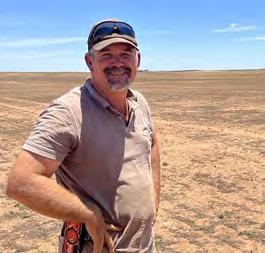
Tim Paschke is a dedicated grain producer and leader in sustainable farming, known for his innovative practices in South Australia’s challenging low-rainfall Mallee region. On his family’s 4,500-hectare farm, Tim has implemented forward-thinking methods such as no-till cropping, stubble retention, and trials to manage dryland salinity, enhancing both productivity and environmental resilience.
As president of the Lowbank and Districts Agricultural Bureau, Tim leads a multi-generational group of approximately 30 members, fostering collaboration and knowledge-sharing within the community. Under his leadership, the Bureau conducts farmer-driven trials and partners with research organisations like Mallee Sustainable Farming (MSF), providing critical support for local producers and advancing sustainable farming techniques.
Tim’s commitment to sustainable grain farming and his leadership within the agricultural community make him a deserving finalist for the South Australian Grain Industry Awards, inspiring others to innovate and adapt in the face of challenging conditions.
What inspired you to pursue a career in the grain industry, and what has kept you passionate about it over the years? I always wanted to be a farmer; you could say I was born into it. I love growing things and there is nothing more satisfying than putting a plan into action, riding the highs and lows and seeing what happens at the end of the year. However, the stress of this is seeing my hair becoming a little bit greyer each year!
What keeps me passionate is the desire to always do better. I love to have my thinking and practice challenged, to see different perspectives and to learn and try new things. And ultimately try to leave the land I farm in better condition to what it was before. This drives me as a farmer and a family man, preparing the way for the future.
Can you share a particular project, initiative, or achievement you are most proud of and why?
Being involved with our local ag bureau has given me great opportunities to learn and keep in touch with lots of amazing people involved in the grain industry. The projects I’ve got the most out of and have been really proud to be involved with, have been run by our Ag Bureau. In 2014, we trialled nine different machines (Discs V Tynes) sowing on the same day in the same paddock to observe the difference between how the machines interacted with chemicals, weeds and yield outcomes. In another trial, we explored different fertiliser techniques involving different deep soil amelioration. All these projects were done on large scale paddock trials which I believe as farmers, we get the most beneficial learnings from, that we can take back and put into practice on our own farms.
What does it mean to be nominated and shortlisted as a finalist or the SA Grain Industry Awards?
Totally blown away with the nomination. I have been focussed on achieving the best outcome for our business, family, and local community, and am humbled that some of the things I have put into practice and tried have been recognised at this level.
Do you believe it is important that the SA grain industry celebrates its contribution to the state and if so, why?
I think it is definitely important. From my travels around Australia, we all have our own locality issues, but South Australian farmers are some of the best at what they do, with the amount of rainfall they receive and how fragile some of our soil types are. I believe that should be acknowledged, not just from the perspective of bringing wealth into the state, but by doing it sustainably.
What advice would you give to the next generation of grain producers or those looking to make a difference in the industry?
Keep trying. The biggest challenge in farming is that things you try may not work given different seasonal conditions. Keep trying; it may work, it might not. I’ve been told so many times, “we’ve tried that” (30 years ago), and I say, “well things have changed, I’ll try it again”.
What’s the biggest opportunity and biggest challenge facing the grain industry in SA at the moment?
Biggest opportunity at the moment for the grains industry is for us to continue to be sustainable. With different seasonal conditions and pricing (grain and inputs), we need to continue to improve our farming, varieties and techniques to continue to move forward and provide food for the world.
Biggest Challenge at the moment for the South Australian grains industry is based around the right to farm. With so much pressure, regulation and red tape, it’s really important for us as farmers to commit to best practice and try to show the government, regulators and the public what is safe and why we do what we do.
sponsored by Cargill

Location: Adelaide
A/Prof. Rhiannon Schilling is a driving force in South Australia’s grain industry, renowned for her exceptional ability to bridge the gap between research and practical on-farm outcomes. Being raised on a mixed cropping and livestock farming property, Rhiannon brings firsthand agricultural experience and a deep understanding of the challenges faced by grain producers.
As the statewide manager of SARDI’s Agronomy program, Rhiannon leads a team of 50 research and technical staff across multiple sites, including Waite, Minnipa, Port Lincoln, Clare, Nuriootpa, and Struan. She is also an affiliate Associate Professor at both Flinders University and The University of Adelaide. Her leadership spans more than $36 million in projects as a lead Chief Investigator (CI) and over $52 million as a project CI, covering critical initiatives like the Australian Government’s Future Drought Fund project establishing the SA Discovery Farms ($8M, 40 partners), the Australian Government funded Soil Microbiome project ($3.2M) and the GRDC-funded National Variety Trials. Rhiannon also founded the South Australian Drought Resilience Adoption and Innovation Hub ($8M, 60 partners).
Rhiannon’s extensive involvement in the agricultural community includes mentoring in the Industry Mentoring Network in STEM (IMNIS), teaching Honours, Masters and PhD students, serving on various committees including the AIR EP Low Rainfall Committee, Ag Institute Australia – SA and as an ex-officio board member for the Agricultural Bureau of South Australia. Rhiannon is the recipient of the AIPS SA ‘Young Tall Poppy Award’ and the University of Adelaide’s ‘Vice Chancellors Award for Outstanding Excellence in Early Career Research’.
Known for her solutions-focused research, Rhiannon has made a profound impact on the grains sector, facilitating innovation and ensuring research delivers tangible benefits for growers. Her dedication, leadership, and commitment to mentorship make her a deserving finalist for the South Australian Grain Industry Awards.
What inspired you to pursue a career in the grain industry, and what has kept you passionate about it over the years?
I was raised on mixed cropping and livestock property at Culburra in the Upper South East of South Australia and have always enjoyed agriculture. I am passionate about supporting our regional communities and I am driven to deliver high quality and relevant research outcomes that make an impact on farm.
Can you share a particular project, initiative, or achievement you are most proud of and why?
I am proud of the new collaboration between Flinders University, SARDI and 40 partners to establish the South Australian Climate Resilience Discovery Farms and Innovator Sites (SA Discovery Farms). We have established four SA Discovery Farms at SARDI’s Minnipa Agricultural Centre, Loxton Research Centre, Struan Research Centre and Turretfield Research Centre, along with 35 Innovator Sites on commercial farming properties across the pastoral, low, medium and high rainfall zones of the state. We are driving new innovations for drought resilience and testing and refining these innovations on farm. In the first year, the project has involved over 800 researchers, farmers and industry members. Long term trials have been established across a diverse range of topics from engineering the soil microbiome, use of virtual fencing, heat stress tolerance in wheat, barley biomass production, development of a hybrid disc seeder, use of soil moisture sensing seeding technology and many others.
What does it mean to be nominated and shortlisted as a finalist for the SA Grain Industry Awards?
I am very fortunate to work as part of a team of researchers and technical staff in the SARDI Agronomy program along with our collaborators to deliver high quality research outcomes for the South Australian grains industry. To me, this recognition is for all the people that I work with each day, including the growers, advisors and industry members in our regions who immensely support the agricultural research innovation in this state.
Do you believe it is important that the SA grain industry celebrates its contribution to the state and if so, why?
The grains industry is vital to South Australia and celebrating achievements is an opportunity to showcase the large number of people who contribute each day to ensuring our industry continues to thrive.
What advice would you give to the next generation of grain producers or those looking to make a difference in the industry?
Don’t wait for an opportunity to come to you – seek out and create the opportunity.
What’s the biggest opportunity and biggest challenge facing the grain industry in SA at the moment?
South Australian grain producers are leaders in adapting farming systems and will continue to adapt to overcome future challenges from climate extremes to end market pressures. On-farm research through initiatives, such as the SA Discovery Farms, provides a significant opportunity to help drive the future innovations needed.
sponsored by Cargill
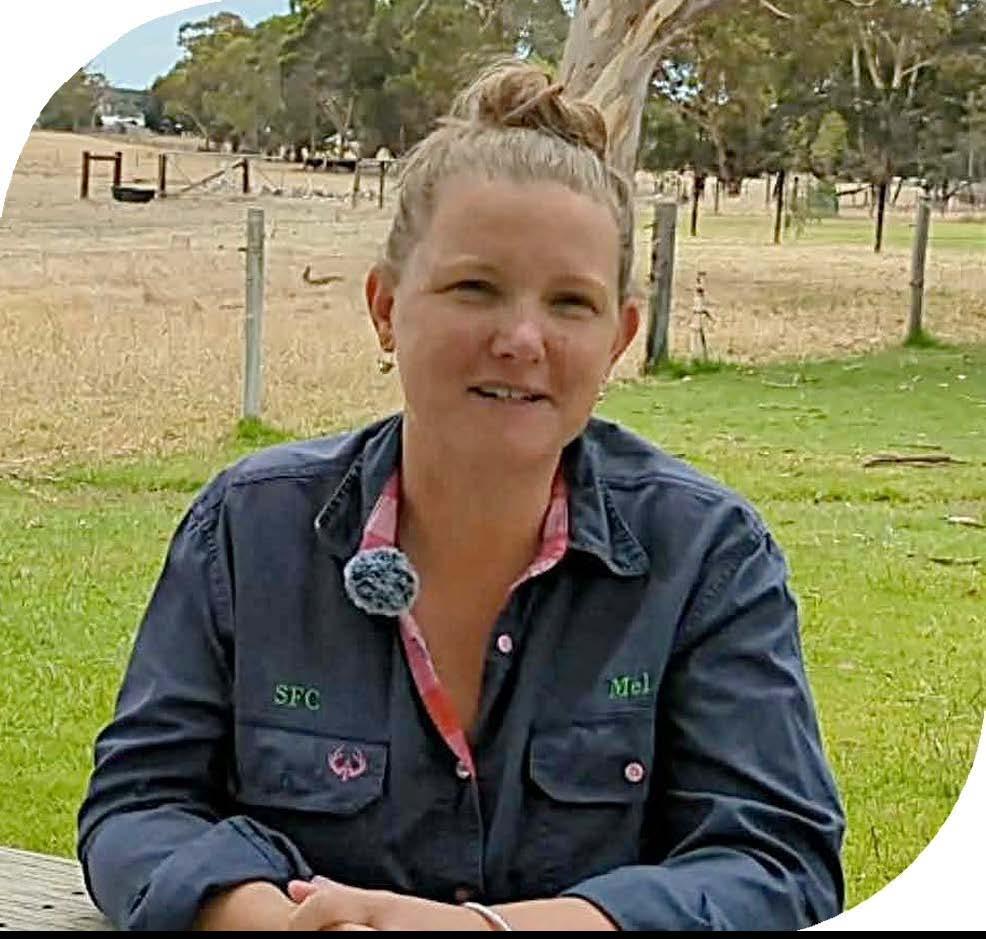
Dr Melissa Fraser
Location: South East
Dr. Melissa Fraser is a soil specialist and passionate advocate for South Australian agriculture, widely recognised for her significant contributions to soil amelioration and farm productivity. As a private consultant and Project Manager for the Mackillop Farm Management Group, Melissa has helped countless growers across the southern region address soil constraints and adopt innovative solutions to improve productivity and sustainability.
Melissa’s impact spans decades, from her earlier role as a Soil Consultant for PIRSA to her ongoing delivery of industry-funded research and technical workshops. She has led countless trials in partnership with GRDC and other organisations, and her expertise is regularly sought by government and industry organisations. Melissa also dedicates her time to mentoring young agronomists, supporting agricultural education programs, and working with Farming Systems groups and Ag Bureaus across South Australia and Victoria.
Praised for her ability to explain complex science in practical, actionable ways, Melissa’s work has transformed sandy soils into highly productive land and empowered growers to make informed decisions about their farming practices. Her far-reaching influence and tireless dedication to improving the industry define her as an exceptional leader and deserving finalist for the South Australian Grain Industry Awards.
What inspired you to pursue a career in the grain industry, and what has kept you passionate about it over the years?
Farming is in my DNA. We left our family farm when I was three years old and I was raised in Adelaide, but I found my way back to agriculture, quite serendipitously, like following a path back home. I love the cyclical nature of farming and the ability to literally reap the rewards of your efforts. The ever-changing environment and the never-ending opportunities to learn (from your successes and your failures) keeps me enchanted by agriculture.
Can you share a particular project, initiative, or achievement you are most proud of and why?
Soil pits are my happy place! I particularly enjoy engaging a bunch of farmers in a soil pit to explore what lies beneath our feet, and how it got there. I love that I can tell the story of the soil in a way that invites questions and further exploration, helping people see their landscapes through new eyes. This awareness leads to better decision making and soil management, and I figure that’s a pretty good legacy.
What does it mean to be nominated and shortlisted as a finalist for the SA Grain Industry Awards?
I already felt blessed to be invited to work right across the southern region, from Elliston to Mildura to Millicent, to share my passion for soil function and strategies to boost productivity by holistically overcoming constraints. To be recognised for this effort is deeply humbling; I am sincerely grateful for the nomination and elated (along with a bit of shock) to be a finalist for this Inaugural Award.
Do you believe it is important that the SA grain industry celebrates its contribution to the state and if so, why?
Yes! I think Agriculture is not great at pro-actively promoting itself and generally flies under the radar. Despite most Aussies enjoying a grains-based meal at breakfast, lunch and tea, I doubt many know where that meal came from, and the amazing innovations that our farmers so readily and rapidly adopt to produce healthy and sustainable foods. It is important to shine a light on our industry and to celebrate the contributions that our farmers make to the health of our people, our land, air and water and our economy.
What advice would you give to the next generation of grain producers or those looking to make a difference in the industry?
There is a place for everyone in agriculture. You don’t need to have been born into it to pursue it as a career. We need analysts and IT gurus, just as much as chemists and engineers and mechanics. Farming is not one single occupation – it is many! If you have a solid dose of commonsense, an inquiring mind, a good sense of humour and the ability to recover from failure, then you’ll find a place in ag, regardless of your technical specialty. And if you want to make a difference, then be the change you want to see; don’t be afraid to take risks, admit when you don’t know the answer and commit to continuous self-improvement.
What’s the biggest opportunity and biggest challenge facing the grain industry in SA at the moment?
A growing global population presents both the biggest opportunity and greatest challenge for the grains industry at present and in the future. An increase in consumer concern for the environment and climate has the potential to hinder both sustainable farming practices (reduced access to herbicides, for example) and production (regulated use of nitrogen fertilisers) if we are not proactively engaged in decision making and policy setting at the State and Federal Government level. The challenge of meeting increased global demand for grains, while lowering carbon emissions, improving resource use efficiency and adapting to a changing climate will need to be met with intelligence, investment, commitment and innovation to support our vital food producers to build and maintain productive and profitable businesses.
sponsored by Cargill
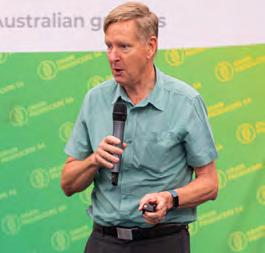
Location: Adelaide
Professor Chris Preston is a leading authority in weed management and herbicide resistance, with a career dedicated to tackling some of the most critical challenges faced by the Australian grains industry. As Professor of Weed Management at the University of Adelaide’s Waite Campus, he has conducted groundbreaking research that has provided grain producers with innovative and practical solutions for managing herbicide-resistant weeds.
Chris’s extensive involvement with industry bodies, including the Grains Research and Development Corporation (GRDC), and his role as chair of the Australian Glyphosate Sustainability Working Group reflect his commitment to sustainable agriculture. His leadership and expertise have not only enhanced weed management strategies but also influenced policies and best practices that benefit the broader industry.
A recipient of the GRDC Southern Region Recognising and Rewarding Excellence Award in 2018, Chris continues to drive advancements in integrated weed management while ensuring his research outcomes are effectively communicated to growers. His contributions to education, research and sustainability make him a deserving finalist for the South Australian Grain Industry Awards.
What inspired you to pursue a career in the grain industry, and what has kept you passionate about it over the years?
I got into agricultural research by accident. What I most like about working in agriculture are the people involved. Farmers are very appreciative that you are working to find solutions to the problems they have. They also often come up with good ideas about how these problems might be solved. It is great to see farmers successfully implementing the research you have been involved in and making a difference.
Can you share a particular project, initiative, or achievement you are most proud of and why?
An achievement was our work that resulted in the introduction of pyroxasulfone (Sakura) for pre-emergent ryegrass control in wheat. When we started working on this project, this herbicide was being positioned for use in corn and soybean markets overseas. Our work convinced the company to look at wheat in Australia and Australian farmers were the first to use the herbicide. In addition to aiding the registration of pyroxasulfone, our work also changed both farmer and company thinking about the role of pre-emergent herbicides in no-till grain production, including the level of efficacy that could be achieved with mixtures and other practices. In addition, it provided farmers with more confidence sowing wheat early to maximise competition against grass weeds and more recently to use dry sowing to deal with seasonal weather variations.
What does it mean to be nominated and shortlisted as a finalist for the SA Grain Industry Awards?
As a researcher, these things are very important to me at a personal level. This is recognition for work that I value as important. It also tells me that my work is making a difference for end users.
Do you believe it is important that the SA grain industry celebrates its contribution to the state and if so, why?
I think it is very important for the grains industry to talk about their successes. A lot of press about agriculture tends to be a bit negative, such as droughts, markets and other problems. Agriculture provides a large contribution to South Australia and there are a lot of great things that are happening in agriculture. Letting the public know about those is important in influencing public attitudes. We just don’t talk about our successes enough.
What advice would you give to the next generation of grain producers or those looking to make a difference in the industry?
As someone who came to agriculture from outside, it is a great industry to be involved in. There are a lot of opportunities as new technologies and new practices are introduced. In research, my advice would be to focus on the big problems, as you will have more impact that way. Work with farmers and others in the industry, as it is not good enough to come up with any solution, it must be a solution that farmers are able to use. Be prepared to change approaches as the problems change.
What’s the biggest opportunity and biggest challenge facing the grain industry in SA at the moment?
The biggest opportunity in agriculture is that in the future we will need to feed more people with less land, in a more variable climate. There will be a need for new, innovative approaches to agricultural production to address this, providing opportunity for completely new ideas. The big challenges are climate change, increasing costs and maintaining social license to operate. We absolutely must bring the public with us on our journey.
sponsored by Viterra
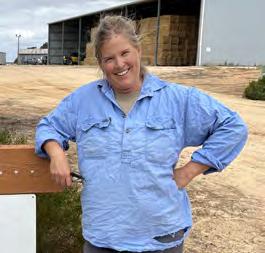
Location: Mallee
Lou Flohr is a dynamic leader and advocate within the grain industry, blending agronomic expertise with practical farming experience to advance sustainable agricultural practices. Based in Lameroo, Lou has consistently demonstrated a commitment to innovation and continuous improvement in her farming operations, making her a deserving finalist for the Women in Grain Award.
Lou is deeply involved in the agricultural community, having served on the Grains Research and Development Corporation (GRDC) Southern Panel and currently as a trustee of the South Australian Grain Industry Trust (SAGIT). In these roles, she has contributed to shaping research priorities and ensuring funding delivers tangible benefits for grain producers. Her participation in the GrainGrowers OnBoard governance and leadership training program further highlights her dedication to personal and professional growth.
Through her leadership and advocacy, Lou has facilitated the adoption of practical research outcomes across South Australia, improving productivity and sustainability for growers. Her passion for the industry and commitment to inspiring other women in agriculture make her an outstanding finalist for the South Australian Grain Industry Awards.
What inspired you to pursue a career in the grain industry, and what has kept you passionate about it over the years?
Growing up on a wheat and sheep farm meant that farming was a big part our family and was a very formative part of our childhood. Moving away from the country to pursue education and travelling made it clear to me that I was deeply rooted in the Mallee, and loved the grit and hard work involved with farming, and the joy- when things work out! The people in the industry have been great to work with, and I get a lot of fulfilment out of growing a tangible product. I enjoy meeting people ‘outside of my patch’ in agriculture from other parts of the country, and this has kept me really engaged, and thirsty for knowledge in agriculture. I think we all strive to be better at what we do, and that keeps me passionate in the industry.
Can you share a particular project, initiative, or achievement you are most proud of and why?
I’m a big believer in the saying: ‘you can’t bem what you can’t see’ and I’ve always enjoyed undertaking industry positions while having young children, to show other young women in the industry that if you want to have influence during that time of your life, you can. It’s important that people hear what you have to say. Having young children while on the Southern Panel for GRDC was an enormous challenge, but I thoroughly enjoyed it, and I am very proud of myself for achieving it. It certainly wasn’t easy, but I hope it has impact on other women who wish to take on industry positions during that phase of your life.
What does it mean to be nominated and shortlisted as a finalist for the SA Grain Industry Awards?
It’s not why you do what you do, but it is nice to be recognised for your input into the industry. Recognising the role that women have on farms has historically been undervalued, and I think the ‘Women in Grain’ is a great category to include in these awards. Many women still struggle to call themselves a farmer, which is an image problem we have in our industry. It’s a privilege to be nominated for this award, and it wouldn’t be possible without all the women that have contributed before me, who haven’t been recognised. Do you believe it is important that the SA grain industry celebrates its contribution to the state and if so, why?
It is important to celebrate the industry. Grains is such an important commodity of the state’s economy, and without its leaders and those who strive to improve the industry, it wouldn’t be the industry it is today.
What advice would you give to the next generation of grain producers or those looking to make a difference in the industry?
Immerse yourself in the industry, listen to its leaders, reach out when you need help, always ask questions, even if you think they are silly, and say yes to opportunities that come your way.
What’s the biggest opportunity and biggest challenge facing the grain industry in SA at the moment?
The biggest challenge at the moment is international competition and cost of production for Australian grains. Our biggest opportunity lies in technology and automation. Widespread adoption of tech and implementation of Artificial Intelligence tools and mapping technologies to improve site specific management across farms is such an enormous and exciting area for our industry, that is likely to be very transformative in the next 30 years.
sponsored by Viterra
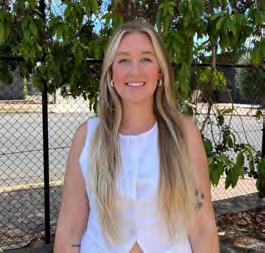
Location: Mid North
Kelly Turci is a dedicated Research Officer and a vital member of the senior management team at AgXtra, where she oversees data collection, statistical analysis, and reporting for over 300 broadacre trials across South Australia, Victoria, and New South Wales. With her exceptional work ethic and attention to detail, Kelly ensures that high-quality data is generated to support the evaluation of new agricultural innovations, making a significant impact on the grains industry.
Since joining AgXtra in 2017 after completing her Bachelor of Environmental Science and Management, Kelly has embraced a diverse range of roles, from IT project management and business administration to social media coordination. Her current role combines her passion for research with her ability to deliver accurate, timely outcomes that meet client objectives.
Kelly thrives on the variety of technologies she works with, including herbicides, fungicides, and bio-stimulants, and her dedication to maintaining strict adherence to research protocols ensures that AgXtra’s trial programs consistently achieve excellence. Known as the “glue” connecting field operations to final outputs, Kelly’s commitment to precision, innovation, and collaboration makes her a deserving finalist for the South Australian Grain Industry Awards.
What inspired you to pursue a career in the grain industry, and what has kept you passionate about it over the years?
The excitement of working at the forefront of research has kept me passionate over the years. In this research space, I am lucky to be working in tandem with clients on new product registrations, new plant breeding varieties, as well as helping to evolve and adopt new on-farm management techniques. The ag space is constantly changing and to be in the midst of that is extremely exciting and rewarding.
Can you share a particular project, initiative, or achievement you are most proud of and why?
The bigger part of my role involves working with our extensive client base on helping to facilitate the development of new innovations and technologies. Being able to be in that space and seeing firsthand what is coming through pipelines and knowing what the future of farming could potentially involve, helps me know that what AgXtra is doing is important. I am proud of myself and the team for providing quality trials and outputs to our clients to help facilitate this.
Being involved with the AgXtra Crop Competition and Adelaide University events always fills me with a sense of pride. It’s an opportunity to be involved with the younger generations and to have a real impact on helping to shape student’s career directions. The students are there because they love being involved in agriculture and it’s exciting to be able to impart small bits of knowledge to them, in the hopes that one day they will be part of the industry’s future.
What does it mean to be nominated and shortlisted as a finalist for the SA Grain Industry Awards?
For me, I work in a confidential space where we are working with unregistered chemistry and breeding lines where there is little to no acknowledgment behind the scenes. So, to be nominated was a shock but its recognition to both myself and the AgXtra team for our achievements over the years. This nomination will keep motivating me to encourage more young men and women to join ag programs and the grains industry because it’s an exciting community to be a part of.
Do you believe it is important that the SA grain industry celebrates its contribution to the state and if so, why?
These awards offer the opportunity to showcase innovation and the leaders within South Australia’s grain sector. I think having a ‘Women in Grain Award’ will help to showcase the amazing work done by women in the industry, as well as highlighting the strong role models we are lucky enough to have in this region. It’s important to celebrate South Australia’s grain industry for the impressive feat that it is, as well as continuing to foster the emerging leaders who are the future of our community.
What advice would you give to the next generation of grain producers or those looking to make a difference in the industry?
My advice would be to embrace technology and innovation. The future of grain production is influenced by advancements in technology – precision farming, new breeding techniques and carbon farming. If you’re able to invest in learning, then you should. Go to field days and demonstration days; the people running those days are there to teach so take any and every opportunity that you are offered. Engaging with organisations like GPSA will help you stay up to date with the latest advancements in research, best practice and policy changes, so joining mailing lists and newsletters helps.
What’s the biggest opportunity and biggest challenge facing the grain industry in SA at the moment?
The biggest opportunity; the advancement and innovation of technologies, in machinery, in the chemistry space and in the plant breeding space.
The biggest challenge; the adoption of these technologies.
I think the grains industry is seeing a shift in the tide when it comes to new technologies. If the investment to continue improvement is there from growers and the industry, then the next five to ten years is going to see rapid change.
This industry is also unpredictable, so being able to adapt is crucial. The ability to respond to changing climate conditions, shifting market demands, or new government regulations is a challenge, but it should also be seen as an opportunity to diversify your farming and practices, as well as looking to new management techniques. Whether that is precision farming to lower input costs, shifting with the markets or sustainability practices, the opportunity is there to try something new and hopefully we will see people benefit for the better.
sponsored by Viterra
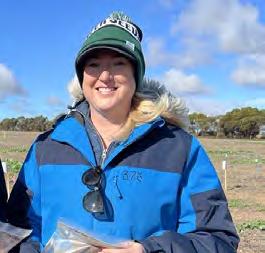
Zoe Starkey is a passionate grain grower, innovator, and advocate for women in agriculture, making a significant impact on the grains industry in South Australia. Based at Starkey Farms near Sanderston, Zoe, along with her husband Scott, successfully manages a mixed cropping and livestock property in a low rainfall region, demonstrating resilience and a commitment to sustainable farming practices.
As the SA Discovery Farms Long Term Trial Coordinator, Zoe oversees over $8 million in research trials through the Australian Government’s Future Drought Fund, advancing drought preparedness across the state. She works tirelessly to connect agricultural researchers, farmers, and industry groups, ensuring research and development outcomes are relevant and practical for grain producers.
Zoe’s dedication to fostering community engagement has been evident through her previous involvement in the Murray Plains Farmers group, supporting various Ag Bureaus in South Australia, and her role as a former WoTL Ambassador for the Murray Plains region. Her participation in leadership programs, including the Australian Grain Leaders Program and the WoTL Stepping into Leadership Program, highlights her commitment to advancing women in agriculture and empowering others to adopt innovative practices.
Zoe’s ability to facilitate knowledge-sharing, drive adoption of sustainable practices, and inspire others to lead has made her a respected figure in the grains industry and a deserving finalist for the South Australian Grain Industry Awards.
What inspired you to pursue a career in the grain industry, and what has kept you passionate about it over the years?
Marrying into farming saw me thrown in to the deep end of agriculture. Curious by nature, I wanted to know why some crops grew better than others when only separated by a fence line. This has fuelled me to want to know why, seeing me attending field days and workshops, upskilling to not only understand the agronomics but the drivers of the landscape we farm in. This passion has seen me moving into the ag facilitation space, hearing the needs, and or gaps, engaging the information and resources to answer the question for growers and seeing it all come together in a project or workshop. Being able to deliver work that is truly needed to help growers become more resilient not only in production but socially, environmentally, and economically, is what drives me. Can you share a particular project, initiative, or achievement you are most proud of and why?
The current program I’m working in is very exciting. I’m lucky enough to be the coordinator of the Long-Term Trials – SA Discovery Farms program, which will see $8m of Future Drought Fund investment delivered across South Australia over 5 years. This investment is focused on mixed farming dryland practice with the program covering four key themes: tailor-made climate smart grain and feed, soil improvement practices to advance soil health, use of precision livestock strategies for healthier livestock and increasing landscape diversification.
In the first year of the project, we have set up long-term trials investigating soil amelioration and additives, modifying the soil microbiome, virtual fencing, adapting pastures to dry conditions, moisture sensing seeding systems, herbicide safety and efficacy in varying rainfall, as well as using plant genetics to build resilience.
Working in the research and innovation space of agriculture has been a new challenge for me, communicating the on-ground needs and challenges of farmers to universities and government organisations in a way that all parties understand and respect, has proven to be a skill strengthened in this role, I’m proud to be farmer Zoe sitting at the table with researchers, providing practical, uncensored feedback on what could be the next big thing for the grains industry, as well as agricultural as a whole.
What does it mean to be nominated and shortlisted as a finalist for the SA Grain Industry Awards?
Not so long ago, I was just a farmer’s wife (a label that many hide behind) until in 2019 when I participated in the Stepping into Leadership program with WoTL, a course that changed my life! I’m still so early in my agricultural journey, it’s hard to think what the next five, 10, 20 years might look like. To see my name among the list of amazing people who do so many amazing things in the agricultural industry within South Australia is unbelievable. Congratulations to everyone!
Do you believe it is important that the SA grain industry celebrates its contribution to the state and if so, why?
We farm in the driest state on the driest continent in the world and Cambrai isn’t known for high rainfall. How far the grains industry has come in the last 20 years is truly amazing and worth celebrating. 1982 is a year often spoken about by farmers and according to Starkey Farms records, 2024 wasn’t too dissimilar. What we achieved in grain yield on our property this past year versus 1982 is a testament to the industry, the innovations, technology and the knowledge extended and adopted by farmers. Well done to all of us!
What advice would you give to the next generation of grain producers or those looking to make a difference in the industry? Get amongst it. There are so many opportunities to be a part of in the grains industry and make a difference. Personally I really value the mentorship, guidance, and openness, which has not only helped me in my career but Scott and I, in our farming business. If you’re struggling with where to start, reach out to someone you feel you could learn off and or get in touch with your local Ag Bureau or Grower Group. Remember there are no silly questions.
What’s the biggest opportunity and biggest challenge facing the grain industry in SA at the moment?
With 2024 being a hard year for most of South Australia, the recovery of the landscape and the bank accounts will not be instant unfortunately. I do, however, see an opportunity to be better connected across the state, different regions sharing knowledge, information and experiences. I have seen on ‘X’ (formerly Twitter) farmers from more reliable areas questioning dry sowing practices, when in the low rain fall environments, dry sowing is a part of the system. This is just one example of how better connection could fill gaps in knowledge. Each year mother nature seems to throw us a curve ball of some sort. Starkey Farms have not had an average rainfall cropping year since 2016 (noting that 2016 was above average). We cannot control the weather, but we can control how we respond and if our farmer network is stronger and larger, then so is our knowledge.
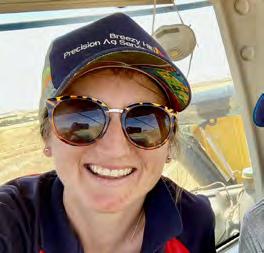
Jess Koch is a leader in precision agriculture, renowned for her innovative approach to enhancing farming efficiency and sustainability. As the founder of Breezy Hill Precision Ag Services, Jess has revolutionised farming practices by integrating advanced technologies and providing tailored solutions that optimise productivity and resource management. Her expertise in data analysis and precision mapping has empowered countless farmers to make informed decisions, resulting in improved crop yields and environmental stewardship.
Jess’s leadership extends beyond her business through her active engagement in the agricultural community. As a former President of the Society of Precision Agriculture Australia (SPAA), she has championed the adoption of precision agriculture techniques nationwide. Additionally, her involvement with the Upper North Ladies on the Land group has focused on upskilling rural women with technical agricultural knowledge, fostering empowerment and inclusivity within the industry.
Through her consultancy, leadership roles, and dedication to education, Jess has made a profound impact on both her business and the broader agricultural sector. Her work serves as a benchmark for modern, sustainable farming and positions her as a deserving finalist for the South Australian Grain Industry Awards.
What inspired you to pursue a career in the grain industry, and what has kept you passionate about it over the years?
The agriculture industry, in particular the grains industry, is a fantastic place to live and work! Having always had an interest in precision ag (grains focused), I studied a Bachelor of Ag at Roseworthy and have attended and organised many events along the way. The networks and the people become lifelong friends.
As farmers cropping in a predominantly low rainfall environment, we are constantly looking to technology to help us overcome challenges. I am a solutions-based person; and the variety in our soils and climate presents us with many opportunities to use data for solutions. This keeps me inspired, motivated and engaged.
The grains industry in Australia continues to be the front runner globally in the development of ag tech, from the initial uptake of autosteer and variable rate management - to developing the very first Autonomy Code of Practice for Ag machinery. Because of this, our industry is an exciting space to work, with endless opportunities to solve problems.
Can you share a particular project, initiative, or achievement you are most proud of and why?
The past couple of years I have been working with a farming business on the Yorke Peninsula to help them work through some precision earthworks projects. We have been renovating country with major drainage issues - that if rectified, could be very productive and high value land. It has been rewarding to bring together teams of precision ag experts I have got to know over the years to help this business - soil specialists, map and drainage experts from northern New South Wales and products specialists from TerraCutta. We have worked together as a team to use spatial map layers, soil tests and CAD design software to create a 3D cut and fill map land levelling design, which was implemented with a scraper to change the water movement in sections of paddocks with crab holes. The results so far have been really promising, and we (BHPAS) have continued to be involved in the management of VR fertiliser inputs for the paddocks as time goes on.
What does it mean to be nominated and shortlisted as a finalist for the SA Grain Industry Awards?
Very exciting! It is humbling to know that someone has seen me as a worthy candidate for this award. We have been consulting as Breezy Hill Precision Ag Services for 6.5 years now, and although I collaborate with many other businesses, most of the time I consult on my own. Being nominated for this award is positive feedback that BHPAS is on the right track and making a difference to the grain businesses we work with.
To be nominated specifically for an ‘Innovation’ award means a lot to me. I look to use the most up to date spatial mapping tools available to farmers to help them overcome issues in their paddocks.
Do you believe it is important that the SA grain industry celebrates its contribution to the state and if so, why? Yes. I could go on about this topic for a long time! But in a nutshell, there is sadly a chasm between the grains industry (and the incredible, innovative work that is done) and the public. Any celebration of the success or contribution to the state can only be a positive in improving and extending this message. What advice would you give to the next generation of grain producers or those looking to make a difference in the industry?
People that work in the grains industry are friendly and passionate and generous with their time. I have found they are more than happy to have a chat on the phone or at an event with those interested in their line of work. Ask plenty of questions and get to some of the awesome events our farming systems groups or industry bodies run throughout the year.
What’s the biggest opportunity and biggest challenge facing the grain industry in SA at the moment?
One of the biggest issues facing us as grain farmers is the cost of growing a crop. Input costs have risen dramatically, meaning that in our business we must use technology as best we can to ensure products are applied as economically as possible.
There are still plenty of opportunities in variable fertiliser application, but I believe that the uptake of autonomous machines (whether they be driverless, or with sophisticated spot spray/application technology) will be the next big opportunity for growers in our state. The first driverless sprayer has been purchased in our district, it’s only a matter of time before many others follow suit.
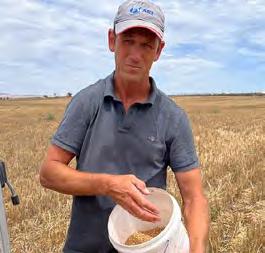
Location: Yorke Peninsula
Sam Trengove is a distinguished agronomist and research consultant based in Bute on the Yorke Peninsula, renowned for his innovative contributions to sustainable agriculture, particularly in the Yorke Peninsula and Mid North regions. As the principal of Trengove Consulting, he leads a team dedicated to enhancing crop productivity and soil health through applied research and precision agronomy services.
With a strong focus on addressing soil constraints, Sam has spearheaded numerous trials exploring soil amelioration techniques, such as deep ripping and the application of organic amendments like chicken litter, to improve crop performance on sandy soils. His work has demonstrated significant yield improvements and economic returns for growers in the region.
Sam’s expertise extends to the management of soil acidity, where he has investigated the efficacy of liming and strategic tillage practices to correct subsurface acidification, thereby enhancing soil pH and crop yields.
Sam has also been instrumental in the development of a method for predicting response to phosphorous (P) fertiliser within paddocks utilising soil pH and satellite imagery data layers, that can be used to produce prescription maps for accurate P fertiliser application.
In addition to his consultancy work, Sam is actively involved in collaborative research projects funded by the Grains Research and Development Corporation (GRDC) and the South Australian Grain Industry Trust (SAGIT). His contributions have been instrumental in advancing the understanding of crop nutrition, fungicide resistance of wheat powdery mildew, harvest weed seed control, herbicide tolerance, and the optimization of lentil production on sandy soils.
Sam’s commitment to the agricultural community is further exemplified by his participation in industry events and his efforts to disseminate research findings to growers, ensuring the practical application of innovative agronomic practices across South Australia’s grain-growing regions.
What inspired you to pursue a career in the grain industry, and what has kept you passionate about it over the years?
My interest in agriculture was forged throughout my childhood growing up on our family’s farm near Bute, where an appreciation for the challenge of optimising the system developed. Like many kids, I liked to ask ‘why?’. Through school and then university, my interest in science developed. To combine these various interests into a career has been a great opportunity, supported by some fantastic people within the industry. The ongoing challenge to optimise agronomic production systems in the grains industry, to identify problems and constraints and find solutions for those continues to motivate. There are many great people in our industry and to be able to contribute in a meaningful way, to work alongside these people and see solutions adopted on farm to improve profitability and sustainability of farming systems is very rewarding.
Can you share a particular project, initiative, or achievement you are most proud of and why?
Over the past six years, we have been involved in developing a methodology for predicting crop response to phosphorous (P) fertiliser application that can be used to produce P prescription maps for targeting fertiliser inputs. This has been generously supported by SAGIT since 2019, and GRDC more recently. The method combines the data layers of soil pH and satellite NDVI imagery of historical crop growth to predict the P response. The investigations have included 57 replicated P response trials to date, to validate and test the concept. The initial concept and investigation funded in 2019 was borne about from years of soil and plant tissue testing on clients’ farms investigating nutritional constraints, where P deficiency was a regular issue identified in poorer performing paddock zones. The increasing availability of soil pH mapping and satellite NDVI imagery from 2015 onwards provided spatial context for where these issues were occurring and the dominant soil chemistry factors locally in the Mid North and Yorke Peninsula that underpinned the low P availability and P deficiency. The methodology has progressed to adoption by growers in the Mid North and Yorke Peninsula and expanded investigation testing for the suitability in other regions, including the Eyre Peninsula and Mallee. Given P fertiliser inputs are one of the largest variable input costs for many South Australian farms, these are important outcomes.
The process that’s been followed, starting with observations in the paddock identifying a constraint, collecting more data to understand the constraint, developing ideas and testing those, formulating a process that growers can adopt, and facilitating that, over a period of 10 years, is what I am proud of.
What does it mean to be nominated and shortlisted as a finalist for the SA Grain Industry Awards?
There are many talented people in our industry, so it is humbling and a great honour to be recognised. To know that the work we’ve been involved with is valued and appreciated within the industry is a great acknowledgement.
Do you believe it is important that the SA grain industry celebrates its contribution to the state and if so, why?
I think the South Australian grain industry has a lot going for it, underpinned by the talented people that work within it in a range of diverse roles. Sharing our stories raises awareness across the community of the modern, technologically advanced production systems that our farmers are deploying to produce great products in a challenging environment. In doing so, I hope they can appreciate what the industry contributes and perhaps create some interest for the next generation to participate in the industry as well.
What advice would you give to the next generation of grain producers or those looking to make a difference in the industry?
Be willing to ask questions and to ask for advice. Be prepared to look over the fence or outside the district. You don’t have to try everything, but be prepared to give things a go, pay attention to the details, observe and refine. Self-awareness, what are you good at, what are your weaknesses. We tend to gravitate to what we’re good at, so how do you manage your weaknesses? Be conscious of that.

Location: Yorke Peninsula
Sam Johns is a forward-thinking grain producer whose innovative approach to sustainable agriculture has positioned him as a leader on the Yorke Peninsula. By implementing advanced precision agriculture practices and being an early adopter of cutting-edge technologies like the Seed Terminator, Sam has significantly enhanced the efficiency and environmental sustainability of his farming operations.
Sam is also deeply engaged in the local farming community, participating in initiatives like the Fat Farmers program, which promotes health and well-being among agricultural workers. His involvement reflects his commitment to fostering a resilient and supportive community for fellow producers. He has also just completed a two-year term as President of the Central Yorke Football Club and four years as President of the Balgowan Progress Association. Sam also voluntarily undertook the cropping program at the Central Yorke School for nine seasons.
As a model of modern, sustainable farming, Sam’s contributions have not only improved his own business but also inspired others in the industry to embrace innovation. His dedication to advancing sustainable practices ensures a stronger future for the Yorke Peninsula’s grain industry, making him a deserving finalist for the South Australian Grain Industry Awards.
What inspired you to pursue a career in the grain industry, and what has kept you passionate about it over the years?
A great opportunity to continue our family farm at Maitland. I really enjoy the variety of work, the flexibility and the community in which I live.
Can you share a particular project, initiative, or achievement you are most proud of and why?
I have enjoyed collaborating with Seed Terminator in a small way to develop their platform for the John Deere X9 harvester. We tested the first prototype for this model in 2022 and I was impressed to see how their engineers designed and integrated the machine, after starting with a blank canvas.
What does it mean to be nominated and shortlisted as a finalist for the SA Grain Industry Awards?
It is an honour but one I feel I don’t really deserve. As I have said, I don’t see myself as being particularly innovative, rather a ready adopter of new technology and techniques but not just for the sake of it. Anything we do adopt must have some sort of tangible benefit, whether it relates to improved financial returns, reducing costs and limitations or simply improving our way of life at work through reduced fatigue and making tasks more efficient. The real innovators are the people who develop new solutions and techniques for problems and spend the time, effort and money developing these.
Do you believe it is important that the SA grain industry celebrates its contribution to the state and if so, why?
The grain industry is a very important contributor to our state. In the face of challenges from mining, environmental movements and urban sprawl to name a few, the industry must demonstrate its importance to the economy, employment and food security. We are constantly developing and improving to meet these challenges, and the general public are often naive to this.
What advice would you give to the next generation of grain producers or those looking to make a difference in the industry?
Keep looking at new ways to tackle problems.
What’s the biggest opportunity and biggest challenge facing the grain industry in SA at the moment?
There are many challenges, and they vary between regions. A common challenge is the continually rising input costs, combined with volatility in rainfall and commodity prices. Higher interest rates currently pose a challenge to many operations also. In our region, one of the major challenges is combatting weed resistance.
















